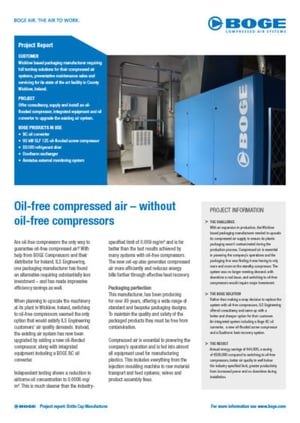There’s an interesting anecdote told by Dan Tyre and Todd Huckenberry, the joint authors of ‘The Inbound Organisation’, about a company called Tube Form Solutions, from Indiana in the United States of America.
Tube Form Solutions manufactures pipe and tube bending, cutting and finishing systems. During a company open house, one of the directors was approached by a prospective customer who said, “We’ve researched a bunch of laser manufacturers online & narrowed it down to two companies: you and one other. We eliminated others based on features, price & reputation. Can we talk about a proposal to purchase?”
This resulted in new business for Tube Form Solutions worth over $500,000.
The point here is that the customer had carried out extensive research online and had not spoken to any prospective supplier before attending the open house. Despite the fact they intended to make a major capital purchase.
They had excluded ‘a bunch’ of potential suppliers simply from their online research.
Inbound marketing stats don’t lie!
The story described above is far from unique, as these statistics (from Forrester and Google/Millward Brown) into B2B buying decisions show:
- 68% of B2B buyers research on-line, on their own before deciding which suppliers to approach
- 71% of B2B searches start with a generic enquiry; i.e. customers are looking for a solution or type of product, rather than a specific supplier
- 60% of B2B buyers don’t want to communicate with sales reps for initial information; they would prefer to find information on-line, in their own time
- 62% of B2B buyers say they develop selection criteria or finalise a supplier list based solely on digital content
The same study also revealed that over half of all research in the initial phases is being carried out by younger members of buying teams – typically millennials – and that as a result the use of mobile and tablet devices is increasing fast; so, too, is video, with 70% of customers watching video at some point during the buying process.
Perhaps the most telling fact, however, is that 74% of all sales are eventually awarded to the first company that sets out to be helpful; i.e. that offers ideas and insight free and on-line.
What all this means for manufacturers
The research quoted above indicates results from all B2B sectors and, although this might affect the overall figures to a degree, we are seeing similar trends across manufacturing and its associated sectors. Individual statistics may therefore be different but the fact remains that the majority of buyers of industrial products and services use on-line research as their starting point when looking for new solutions or suppliers.
It’s also true that, in common with all B2B buyers, industrial customers are looking for suppliers that can help them understand and resolve challenges that they may not yet have identified, or that can deliver insight that helps them improve their manufacturing or business processes.
Provide insight
As an example, one of our clients, BOGE Compressors, was contacted by a manufacturer of plastic packaging for the food sector. The customer believed that they needed oil-free compressors as part of substantial factory upgrade and had carried out considerable research online to identify the best solutions.
Although BOGE could have followed the route suggested by other suppliers of installing oil-free machines – at considerable capital cost to the customer – instead they invested time and expertise to help the customer understand the wider challenges that they faced with their compressed air equipment: high energy costs and unnecessary downtime due to inefficient configuration, as well as the need for oil-free compressed air.
This holistic approach, driven by deep understanding of the customer’s business, led to a solution using conventional compressed air technology.
The BOGE solution is producing oil-free air to a standard that is well within the industry specification, saving £14,000 on energy costs and, through the use of an innovative heat recovery systems, reducing annual office and factory heating costs by £30,000.
The point here is that our client was able to provide the insight and knowledge to make a dramatic difference to their customer’s business – not least, with a capital saving of around £0.5 million, compared with their original plan to invest in oil-free compressors. You can read the full case study that we’ve produced by clicking on the button below.
This approach will be familiar to most manufacturing companies. The difference for many, however, is that they either guard this knowledge as though it’s a state secret or fail to recognise or exploit the intellectual skills and resources inherent within their sales teams. This is often because the focus is on transactional short term sales goals, rather than a strategy that encourages consultative selling that builds long term customer value.
This is a wasted opportunity.
Put it out there
Numerous surveys demonstrate what we all know from experience to be true; customers want to buy from companies that can help them solve problems and that deliver real business value. Unless we’re talking about the most basic of commodity products, customers don’t want suppliers that sell simply on the lowest possible price, with zero added value.
So if:
- Customers are starting their search online, looking for suppliers who can provide insight, ideas and inspiration
- Manufacturers have a wealth of knowledge and experience to share
then the logical conclusion is to connect the two using the appropriate online channels.
The sticking point for many manufacturers is being willing to share what they often consider to be unique knowledge that is hard-won over many years.
I believe that this is misguided.
If we want customers to approach us, then success in the digital space depends on the quality and creativity of information that we make available, free and without condition, to our customers.
This information needs to be of high quality and to offer a unique perspective on the supplier. It’s not about selling, but about providing the thought leadership and ideas that help prospective customers reach out to us as potential partners that can add value to their businesses.
Remember the statistic quoted above: 74% of all sales are eventually awarded to the first company that sets out to be helpful.
It’s time to start helping and stop selling.
If you’d like to learn more about our approach to inbound marketing for manufacturers you can download our latest white paper …… free and without conditions!!




